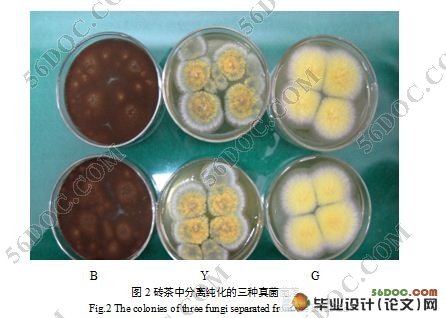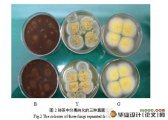砖茶中所分离真菌的分子鉴定
来源:56doc.com 资料编号:5D6125 资料等级:★★★★★ %E8%B5%84%E6%96%99%E7%BC%96%E5%8F%B7%EF%BC%9A5D6125
资料以网页介绍的为准,下载后不会有水印.资料仅供学习参考之用. 密 保 惠 帮助
资料介绍
砖茶中所分离真菌的分子鉴定(含选题审批表,任务书,开题报告,中期检查表,毕业论文12000字)
摘 要:ITS是内源转录间隔区(Internally Transcribed Spacer)的英文缩写,是位于rRNA编码基因18S、5.8S和28S之间的小基因片段。本试验通过SDS法提取砖茶中三种真菌基因组DNA,利用真菌rDNA-ITS通用扩增引物经过PCR克隆出三种真菌的不同ITS序列,登陆美国NCBI的GenBank比对,从GenBank获取相似序列,使用BLAST工具对三种真菌的rDNA-ITS 序列进行比对分析,并通过中国科学技术资源共享网对不同真菌菌落的分析,对所分离的真菌进行鉴定。结果表明,砖茶中所分离的三种真菌分别为塔宾曲霉、斑点青霉以及阿姆斯特丹散囊菌。
关键词:砖茶;真菌;ITS序列;分子鉴定;PCR扩增
Molecular Identification of the Fungi Separated from the Brick Tea
Abstract: ITS is short for Internally Transcribed Spacer, and it is the small genes fragment which located in the encoding gene of rRNA among 18S,5.8S and 28S.The genome DNA of three species fungi were extracted by method of SDS, various ITS sequences were cloned out by PCR which use the rDNA-ITS universal amplification primer of fungi, comparative analysis were taken out though the GenBank of NCBI and the similar sequences were obtained. Then, the three kinds of fungi rDNA-ITS sequences were comparatively analysed through BLAST. Additionally, the separated fungi were identified by associating with the China Science and Technology Resource Sharing Network. The results shows that the separated fungi from the three kinds of brick tea are Aspergillus tubingensis,Penicillium sumatrense and Eurotium amstelodami.
Key words: Brick tea;Fungus;ITS sequence;Molecular identification;PCR amplification

目 录
摘要…………………………………………………………………………………………1
关键词………………………………………………………………………………………1
1前言…………………………………………………………………………………………2
1.1砖茶简介………………………………………………………………………………2
1.2砖茶真菌的鉴定及分类………………………………………………………………2
1.3利用ITS序列对砖茶真菌进行分子鉴定……………………………………………5
2材料与方法…………………………………………………………………………………7
2.1材料……………………………………………………………………………………7
2.1.1 试验材料………………………………………………………………………7
2.1.2 试验试剂………………………………………………………………………7
2.1.3 主要仪器………………………………………………………………………7
2.2 试验方法……………………………………………………………………………7
2.2.1真菌基因组DNA的提取纯化……………………………………………………7
2.2.2三种真菌ITS序列的PCR扩增及其切胶纯化…………………………………8
2.2.3三种真菌ITS序列的比对分析………………………………………………9
3 结果与分析………………………………………………………………………………10
3.1 三种真菌接种在可溶性淀粉培养基上培养后的菌落形态………………………10
3.2 基因组DNA提取后的电泳检测结果………………………………………………10
3.3 PCR产物电泳检测结果……………………………………………………………11
3.4 PCR产物测序结果以及分析………………………………………………………11
4讨论………………………………………………………………………………………14
5结论………………………………………………………………………………………16
参考文献 …………………………………………………………………………………16
致谢…………………………………………………………………………………………17
|



